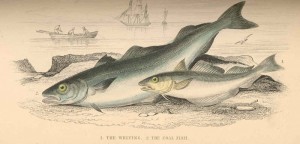Sula bhFágfaidh Muid Na Liúdair … Posted by róislín on May 18, 2012 in Irish Language
(le Róislín)
I ndáiríre, is é ábhar an bhlag seo ná “ainmneacha teangacha,” ní na liúdair iad féin. Why’s that? I found the word for “coalfish” in quite a few languages, so I figured we could do another match game. Several of the languages have more than one word for “coalfish” so please expect to find several languages mentioned more than once.
So, really, this blog is more an exercise in tíreolaíocht than in bitheolaíocht mhuirí. In almost all cases, a language name in Irish more or less matches the country or region that it comes from, as also happens in English and most other languages. A few prominent exceptions that come to mind are: Gaeilge/Éire, Béarla/Sasana, Sanscrait/an India (ainm na teanga ón bhfocal saṃskṛtāvāk, “caint chaoin“), and Svaihílis, Ciosvaihílis/an Afraic Thoir (ainm na teanga ón Araibis sāḥil, a chiallaíonn “teorainn” nó “cósta”), and I’m sure there are some others. To some extent, “Laidin” follows suit, but that’s really only because we don’t talk much “Latium” (Lazio in Iodáilis an lae inniu) these days. But the names of most teangacha are based on logainmneacha. Freagraí can be found thíos, mar is gnách.
| Ainm an Éisc | Ainm na Teanga |
| 1) sei | a) Béarla |
| 2) swarte koolvis | b. Gaeilge na hAlban |
| 3) glasag | c) Danmhairgis |
| 4) levneg | d) Gaeilge na hAlban |
| 5) ufsi | e) Fraincis |
| 6) gloshan | f) Ollainnis |
| 7) ucsa (nó “ucsa” nó “ugsa”) | g) Briotáinis |
| 8.) saithe | h) Íoslainnis |
| 9) carbonero | i) Béarla |
| 10) colin | j) Spáinnis |
I thought I had found the Welsh for “coalfish,” namely “chwitlyn glas,” but looking further into that one I find “chwitlyn glas” also means “blue whiting” so now I have my doubts. Is a blue whiting the same as a coalfish? An ionann “chwitlyn glas” agus “liúdar”? Eolas ag Breatnach ar bith ar an liosta? A blue whiting sounds like a contradiction in terms to me, anyway, but who am I to say? As long as we keep the blue whiting out of the bluing, I guess all will be well.
With all of these terms available, I suppose we could translate the folk expression “ag breith liúdar go Toraigh” into lots of languages, if we wanted to. But for now, let’s leave the liúdair to Irish, and bid at least a temporary adieu to this topic. Maybe at some future point we can revisit expressions of futility in Irish and/or other languages. But somehow, I keep finding more, even since the last blog, mar shampla “dátaí go Hajar” (for more on this date-growing town in the al-Hasa oasis in eastern Saudi Arabia, see http://www.saudiaramcoworld.com/issue/200404/.carrying.dates.to.hajar..htm). And perhaps one’s mind wanders back to all that beoir which is being sent “go München.” Since they have a ndóthain beorach, how ’bout scattering cúpla ceaig here and there so we can all partake in its “iarmhairt mhúchta” (quenching effect; I haven’t been able to find an exact equivalent to the compound adjective “thrist-quenching,” aon bharúil agat?).
Pé scéal é, tá na freagraí thíos, and I hope you enjoyed this joint geographic-linguistic undertaking. I’ll certainly look even more carefully next time I’m in a bialann looking at the bia mara on the biachlár, especially if it’s in coalfish territory. SGF, Róislín
Freagraí: 1c) sei, Danmhairgis (+ Ioruais, Sualainnis); 2f, swarte koolvis, Ollainnis; 3d) glasag, Gaeilge na hAlban; 4g) levneg, Briotáinis; 5h) ufsi, Íoslainnis, 6i) gloshan, Béarla (bunaithe ar an nGaeilge, is dócha, Gael-Bhéarla nó Béarla Éireannach, mar sin?); 7b. ucsa et al., Gaeilge na hAlban; 8a) saithe, Béarla (ón SeanLochlainnis, seithr, mar “sei“); 9j) carbonero, Spáinnis; 10e) colin, Fraincis (+ Spáinnis), agus “goberge” i bhFraincis Cheanada.
Does this mix need adding to? Terminology never ceases, it seems. While this fish is marketed in the U.S. under the official name “pollock” (presumably also as “pollack”), in Canada it is marketed as “Saithe,” “Pollock,” “Coalfish,” “Boston Bluefish,” and “Big-Eye” (according to http://www.tradexfoods.com/fish-species-encyclopedia/saithe)

Build vocabulary, practice pronunciation, and more with Transparent Language Online. Available anytime, anywhere, on any device.





Leave a comment: